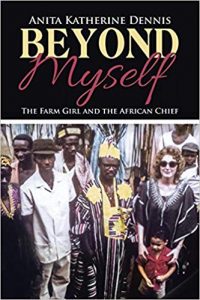(Akiit.com) Today, interracial/cross cultural marriages are not unusual. That was not true in the 1960s when I fell in love with my anthropology professor who was a hereditary Mende chief from Liberia, West Africa. Our marriage posed problems along with opportunities that I was too naïve to have imagined at the time.
I grew up on a farm in northwest Ohio in a very sheltered childhood during the 1950s. I poured over the World Book encyclopedia in our dining room bookcase- dreaming of lands beyond. In the safety and comfort of home, it was fun to think of faraway places, never considering the challenges involved in going there and more so, living there. My dream to visit Australia peaked during my senior year of high school, but there were no funds and thus no hope. Travel remained a distant wish.
Studying journalism at Ohio University in southern Ohio opened a new vista to me – being on campus and walking around town, meeting all kinds of people, including black people and immigrants for the first time. Falling in love made the world come to me. The professor I eventually married in 1968 led me into a life of travel and adventure – as well as my parent’s rejection and raising biracial children.
I knew nothing of Liberia (or Africa for that matter) when I first visited his tribal village. The only thing I had read concerning Africa was in the 8th grade at a rural elementary school. In one of the bookcases, I found a book that told the story of a boy in the Congo who rode in a canoe.
Recently married and eager to please my husband, I found myself on a jet airliner in 1972 heading over the Atlantic – soon to be enveloped and adopted by the Mende tribe that would be my new family. Each day I was faced with sights and sounds unlike anything I ever heard described in books. The capital city of Monrovia seemed civilized enough but even that was an adjustment. Then we went upcountry to his remote village where some small children had never seen a white person.
I was carried in a chief’s hammock over the Kamboi Mountain Range through the high forest. As our traveling party wound its way, we followed a well-worn foot path through trees towering above. At each stream, I scrambled out to nervously walk the log bridge steadied by a Mende hand. The line of people walking ahead of me with bundles on their heads made me feel like Jane in a Tarzan movie. Here’s how it all happened as I remember it:
“As we approached Ben’s father’s village of Vahun, we heard celebratory gunfire. Everyone in our party picked up the pace. Suddenly a large crowd of men enveloped me, shouting with joy. I was rushed and swept along with them to a half-walled gravesite, covered by a corrugated roof, in the center of the village. The air inside was stifling from the afternoon sun, and the men crowded around me. Ben stood over the grave of his ancestor, Ngombu Tejjeh, weeping. I longed to wrap my arms around him, but I couldn’t say or do anything.
Outside, around a hundred people stood reverently watching, yet filled with excitement. It was clear they were enthusiastic to see Ben. A week earlier, word had gone out that the son of Ngombu Tejjeh was coming home after twenty-three years away. The crowd was larger than usual since Mende relatives from Sierra Leone traveled there to see the return of their “native son.”
In rapt silence, every eye was on Ben as he poured a large, expensive bottle of gin on the grave, gently coached in the ritual by his brother Patrick. More tears and ceremony followed. As the elders standing with Ben began to leave, I realized how much his people meant to him—and he to them.”
I loved my husband’s “other culture” viewpoint. He made me see the world in the eyes of a Mende. When we wrote a book together, I recorded his childhood stories in the village. In essence, I learned more about him than I ever did. I have no regrets. He opened a new world to me full of opportunities to stretch my mind and my heart.
Today, I’m 73 and not so adventurous. My husband and I had 40 and a half years of a wonderful marriage before he died nine years ago. I coped with my grief by writing our love story.
Written by Anita Katherine Dennis
Purchase Book; Beyond Myself: The Farm Girl and the African Chief. (—-
Official website; http://www.anitakdennis.com









Leave a Reply